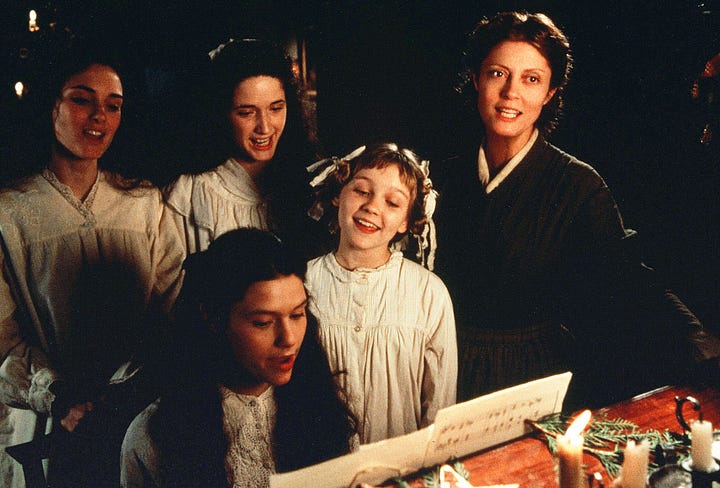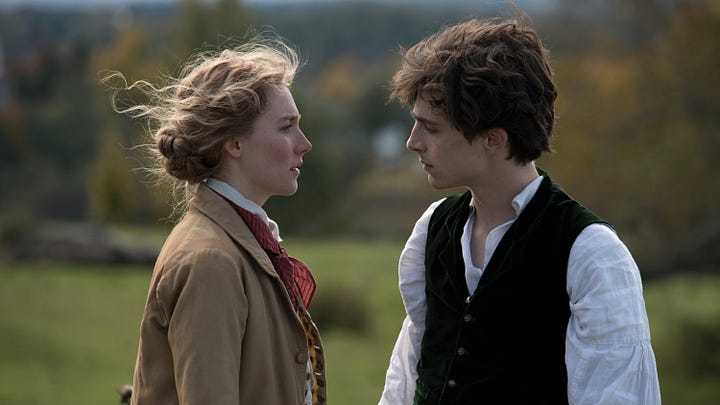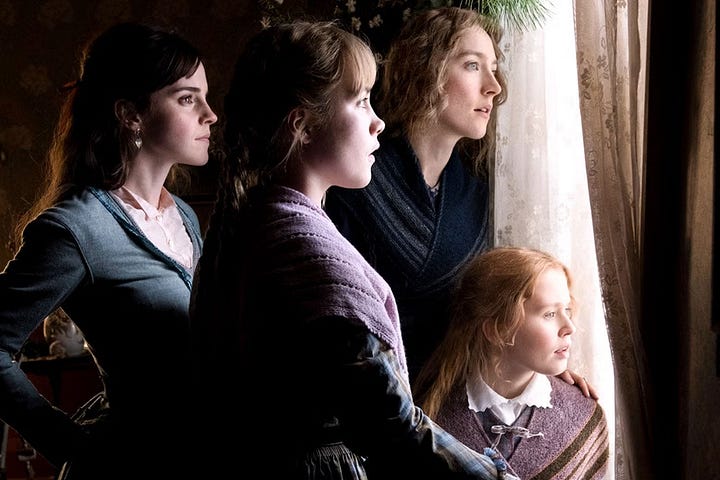I recently watched Greta Gerwig’s film Little Women. This might not seem groundbreaking to you, but I had avoided it like the plague during all that 2019 promo and praise. There was no way it would be better than or even compare to the 1994 Gillian Armstrong version, a movie that raised me. I must have been a child the first time I saw it because it feels like it has always existed for me, that I’ve known all the lines since birth.
It’s a movie my sister and I would watch a lot during the winter as we are the types that need our viewing material to mirror that of our natural world. Since so much of Little Women seems to take place in the cold pre and post-Christmas days in Concord, MA, we wrapped ourselves in blankets on the living room couch along with the March girls. I related instantly to Jo March and her desire to write. I remember being jealous of her ink stained fingers, how people could tell she was a writer just by looking at her. I suppose I’m still jealous of that.
Gilliam Armstrong’s film is also 90’s girl heaven starring Kristen Dunst, Winona Ryder, Claire Danes, and Susan Sarandon — the woman who had starred or would star in all my other favorite TV and movies, i.e., Thelma and Louise, The Virgin Suicides, All I Wanna Do1, My So-Called Life, and Mermaids, just to name a few.
And Timmy Chalemet is cute and all, but my Laurie is Christan Bale. I’m certain he was my first movie crush. With his breathy laugh and imperfect teeth, I was smitten.
So, for all this time, I assumed Greta’s movie was just another remake that didn’t need to be remade.


*
I’ve been very into listening to podcasts about screenplay writing lately, specifically Scriptnotes with John August and Craig Mazin. In a recent encore episode, they replayed a conversation John had with Greta Gerwig, in which they speak about her time writing Little Women and break down some parts of the script. I started listening, despite having not seen the film yet.
What drove me to watch it was hearing Greta speak about how she came to write the screenplay and what her version entailed. It was very much the opposite of my assumption. Granted, it was an assumption based on nothing but my own snobbery and my firm principle that every movie from the 90’s is superior to modern day film. Occasionally, like today, I have to reel that back. (but most of the time, I’m right!)
Greta said that while she was moving out of her apartment, she found and started to flip through her old childhood copy of Louisa May Alcott’s Little Women. Rereading it in her thirties felt like she had never read it before, despite countless rereads as a kid. She immediately began to envision it as a movie.
“To me,” she said. “This book is about authorship, ownership, and about women and money and how that intersects with artistic output.”
This is what stopped me. I’m continually drawn to conversations about money, especially in the context of what we do for a living versus our art. The novel I’m working on now is all about money —not having enough, envying those who have it, and the desire to want more even when you feel unworthy or foolish for wanting it.
Greta’s read of the text piqued my curiosity enough for me to climb over the protective wall I had built and give the 2019 version a try.


I’ll be honest, it took the entire first hour for me to commit to it fully. Because both movies take so much direct dialogue from the original text, it was hard for me to listen to Saoirse Ronan as Jo deliver lines that I had heard Winona Ryder say for over twenty years. I was automatically comparing, even though I told myself to watch the film objectively. So, for those first 60 minutes, I struggled.
I won’t get into all of my comparisons because that’s a whole separate post. I will say that once I was invested, I loved the way Greta structured the film, moving back and forth in time. It also made Professor Bhaer’s appearance feel not as random and abrupt as Armstrong’s version. I also thought the scene —you know THE scene where Jo breaks Laurie's heart—was just as equally gut-wrenching, if not more so, from Ronan and Chalemet’s performances and the extension of the scene that showed more of their quarreling and Laurie’s raw desperation. Ugh. So heartbreaking.
But what I particularly enjoyed was Greta’s emphasis on the making art as a woman conversation. Jo’s writing and writing practice felt more at the forefront in her version —Jo’s ink-stained fingers on center stage as she pieced her novel together on the floor in the attic. (God, I love a writer writing montage.) As the audience, I could feel her desire to write. But I could also feel her hesitation. Her doubt.
*
After Great Aunt March dies and leaves Jo her house, Jo tells Meg and Amy she is thinking about using it to open a school.
“What about your writing?” Amy asks.
“What about it?” Jo replies.
Meg and Amy ask her what she is working on, to which Jo says, “I started something... but I don’t think it’s very good.”
Amy insists everyone loves her writing, and they press her for what it's about.
“It’s just about our little life,” Jo says. “Who will be interested in a story of domestic struggles and joys? It doesn’t have any real importance.”
Here is how the rest reads in the script:
AMY
Maybe we don’t see those things as
important because people don’t
write about them.
JO
No, writing doesn’t confer
importance, it reflects it.
AMY
I’m not sure. Perhaps writing will
make them more important.
*
Last month, I had the absolute pleasure of interviewing Etaf Rum for her new novel, Evil Eye. This is the second time I’ve spoken to her as I was lucky enough to speak with her back in 2018, right before her first novel, A Woman is No Man, jumped to Bestseller status and was A Read with Jenna Pick. During the course of our conversation this time, she said something I can’t stop thinking about.
She explains that the protagonist of Evil Eye, Yara, feels very sheltered as a Palestinian American woman who, despite teaching art and working outside of the home, still feels like she’s never had a chance to explore the world the way others have. In her culture, it's the norm for your father to hand you over to your husband—you go from one home to the next.
“And that was also the norm in how I was raised. I also feel like a sheltered artist, and that sometimes makes me feel like I’m inadequate. I’m not as well-read, or I’m not as well traveled, or I don’t know much about pop culture, and I don’t know much about all of these influences that help make writers make these connections that are outside the mundane of daily life. So for me, it’s like, is that all I can write about? Can I only write about the mundane? I can’t write about politics and all these bigger ideas. And it was an insecurity for me because I was sheltered. So there were always these questions as I was writing, like, do I belong here? Do I belong in this world? Do I actually have anything valuable to say? Those are some things that I also had to work through and accept about myself. Although I am a sheltered artist, I still have something of value to contribute.”
I was immediately moved by this and thanked her for sharing. I told her although I didn’t grow up the same way she did, I can very much relate to what she said. I grew up in a religious home and, throughout my youth, often felt like I didn’t know as much as everyone else. I was definitely sheltered. Some of that was for the good, and some of it left me feeling as though I was missing out. Especially in college, where I swore I was always the least well read one in the room, the one who wasn’t politically savvy or worldly enough to be there. I so often felt and like a sheltered artist, too. I still do.
*
When I can’t help it, and I compare my novel to others, I think, I’m not saying anything very big here. I’m just telling the story of a girl who wants to run away from herself, who makes poor decisions, who works in a restaurant. Who thinks too much about her gone father and her loving yet frustrating mother and how she wants to be something more than she is.
Am I saying enough about the world we live in? Will this story be of value to anyone but me?
In such a content driven world, it feels like every time you say something, you have to say something. You have to provide your value, to hook people from the word go. To have a strong opinion and stick to you—have all the facts and reasons why ready to aim and fire.
It’s so tiring out there.
*
There was a day in college I will never forget. We read “Lust” by Susan Minot in my creative fiction workshop. Finally, something written by a woman. I wanted to throw my hands up in praise. I had had enough of Donald Barthelme and Tim O’Brien, but I wasn’t sure I could say that out loud. After we read Susan’s story, when the class cleared out, I went up to my professor.
“This,” I said. “I want more of this.”
And bless him, he handed me his old copy of Bad Behavior by Mary Gaitskill, and my world was cracked up, as raw and bright as an egg yolk. There were the stories about women and their secrets, and desires, and embarrassment. Their shame, and their darkness, their ugliness and beauty. Here were all their little lives laid out in front of me.
*
Towards the end of the episode of Scriptnotes, when asked why she adds so much detailed language and emotion to the actual screenplay itself when so often just basic directions or descriptions will do, this is what Greta said:
“I always want every piece of making a movie to be as excellent as it can be. The truth is I don’t know if it's going to become a movie because its so unlikely because they are so unwieldy and expensive and it takes so long. So, for the moment, all I have is this script. And I want it to be as good and as emotional and as detailed and as specific and honestly, as dense, as it can be. Because this is all I have of the movie in this moment. I don't have the movie yet. So I want every piece of it to feel that way because I can will it into existence if I can feel it on the page.”
I think this goes for life as a writer, too. Fighting through imposter syndrome, insecurity, comparison. Feeling that what you say or what you are interested in has no value in our society. We have to work through these things and will our writerly selves into existence by continuing to write despite all that noise.
Would I keep writing this novel if no one wants it? I ask myself. If no one else will ever read it?
And the answer is always yes. Yes. Yes. Yes.
So, by continuing to write about the little life of a waitress, I’m creating its importance. I’m willing it into existence just like Etaf Rum did, these stories of domestic struggles and joys.
As a sheltered artist, I will probably always write about little lives. I probably won’t have anything very earth-shattering or groundbreaking or viral to say. But I’m okay with that. As long as I keep writing, that’s the important part anyway, right?
This film has had a few different names, thus why you have probably never heard of it. Sometimes it’s called Strike!, although the original title was The Hairy Bird, but “Miramax, the film's American distributor, found the title too offensive as it alludes to male genitalia.” LOL. It’s about an all-girls school in the 1960s that is set to be combined with the nearby boy’s school, with a stacked cast of Kristen Dunst, Gaby Hoffman, Rachael Leigh Cook, and Vincent Kartheiser, who says one of the most quotable lines of the film to Monica Keena—“You’re so beautiful I could eat your teeth.” Do yourself a favor and watch it. It’s pure delight.




Thank you. Couldn't love this more. It seems Little Women is to me, what it is to you and I felt exactly the same about the new version and had also avoided it.
I also loved it ... but then these characters are so wonderful, I realised it would be impossible not to love them all over again. (She says reaching for her copy of Little Women/Good Wives)
LITTLE WOMEN always has been & will be one of my guiding lights, but what I'm here to say is that Susan Minot's "Lust" shook me when I read it at sixteen. Continues to loom large over my fiction (& probably beyond).